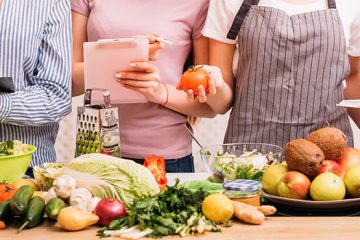I am Vegan, Am I at Risk of Any Deficiencies?
Vegan diets can have many health benefits as they can contain an abundance of vegetables, whole foods and fibre from whole-grains. However, they may not contain all the essential nutrients. To avoid a deficiency, a person should be sure to consume a variety of nutritious plant-based foods and consider taking supplements if they do not eat a variety of foods in their diet.
Unless a person plans their vegan diet very carefully, supplements in vitamin B12, vitamin D, iron, iodine and omega-3 fatty acids may be required.
Vitamin B12
Vitamin B12 is the most critical nutrient in vegan diets, as it is found almost exclusively in animal-source foods. Vitamin B12 deficiencies can cause symptoms that include but are not limited to tiredness, weakness, constipation, unexpected weight loss, loss of appetite, tingling in the hands and feet, soreness of the mouth and tongue, confusion and depression.
The current recommendations from the National Institute of health are as follows :
Source: National Institutes of Health
Some vegan foods are fortified with B12, but they may not provide enough. Vegan food sources of B12 include
- Nutritional Yeast
- Marmite and Yeast Spreads
- Fortified Soy and Almond Milk
- Plant-Based Meats
- Fortified Cereals
- Tempeh
- Chlorella
- Nori Seaweed.
According to the Vegan Society, UK. To get the full benefit of a vegan diet, vegans should do one of the following:
- Eat fortified foods at least two or three times daily to get at least 3 mcg of B12 a day
- Take a B12 supplement daily providing at least 10mcg
Omega 3
Omega-3 fatty acids contribute to heart and brain health. The three main types of omega-3 are alpha-linolenic acid (ALA), docosahexaenoic acid (DHA), and eicosapentaenoic acid (EPA). However, in a vegan diet, you can only consume the ALA form.
On a daily basis, make sure to consume at least one of those foods:
- 1 tbsp (15g) of ground linseeds or chia seeds or hemp seeds
- 50g of walnuts
- 1 tbsp (15ml) of canola oil
- ½ tsp (2.5ml) of linseed oil
Iodine
In the UK, the recommended iodine intake for adults is 140mcg per day. The body does not produce iodine, so a person needs to get it from their diet. Seaweed contains high amounts of iodine, however, its practicality is questionable. Some vegan sources of iodine include iodized salt, soy milk, seaweed, cranberries, potatoes and prunes. A non-seaweed supplement is the most reliable way of meeting your body’s need for iodine.
Iron
Iron is a mineral with several important functions throughout the body, this includes helping blood cells carry oxygen and supporting brain health. Iron deficiencies may cause anaemia, which restricts oxygen delivery to cells around the body.
Symptoms of an iron deficiency include fatigue, weakness, pale or yellowish skin and increased susceptibility to infections. Plant-based products contain non-heme iron which is not as easily absorbed compared to heme iron found in animal products.
Great plant-based iron sources include:
- Lentils, chickpeas, soybeans & tofu
- Pumpkin seeds
- Kale and spinach
- Quinoa and oatmeal
- Fortified breakfast cereals.
Consuming high-iron foods with foods that are high in vitamin C will enhance the ability to absorb iron. Examples:
- adding lemon juice over your lentil salad
- putting strawberries in your oatmeal
- having red bell pepper in your tofu fajitas
- mixing broccoli with spinach in your all-greens soup
- include canned tomatoes in your garbanzo stew
- combining roasted soybeans with a fruit such as a kiwi, an orange or a mango
Vitamin D
Vitamin D helps absorb calcium for healthy bones and protect against chronic bone conditions, such as osteoporosis. The body makes Vitamin D from sun exposure. In the UK, there are concerns that we do not get enough to keep our bones and muscles healthy. A vitamin D intake of 10mcg (400UI) per day is recommended from the month of October to March and exposure to sunlight of at least 5-15 minutes/ day during the summer months.
Calcium
Calcium is an important mineral for bone health and muscle functioning. A deficiency could increase the risk of problems such as bone fractures. Calcium set tofu, calcium-fortified milk and yoghurt alternatives and soya and linseed bread fortified with extra calcium are good sources. Other useful sources are kale, watercress, okra, tahini, dried figs, haricot beans and almonds.
Other nutrients that may need to be considered include Selenium and Zinc.
To avoid nutrient deficiency, it is a good idea to work with a dietitian, who can help develop a tailored plan to avoid nutritional deficiencies.
By Jenaed Brodell, Sports Nutritionist, Registered Dietitian
References
Nair, R., & Maseeh, A. (2012). Vitamin D: The “sunshine” vitamin. Journal of pharmacology & pharmacotherapeutics, 3(2), 118–126. https://doi.org/10.4103/0976-500X.95506
Rogerson D. (2017). Vegan diets: practical advice for athletes and exercisers. Journal of the International Society of Sports Nutrition, 14, 36. https://doi.org/10.1186/s12970-017-0192-9
The Vegan Society (2021). https://www.vegansociety.com/







